By Linda Johnson, donor relations specialist, WCA Foundation
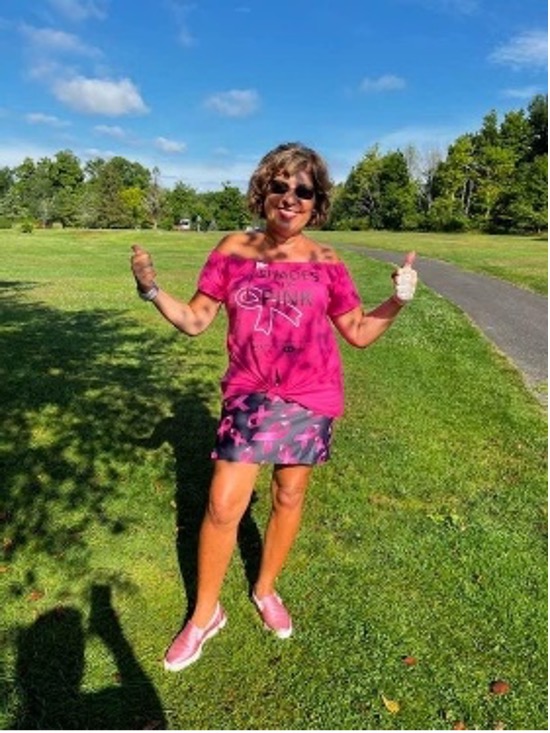
Anne Sischo, breast cancer survivor, is shown dressed a pink, printed with the pink ribbon, the instantly recognized symbol and signifying breast cancer awareness celebrates her survivorship at the annual Shades of Pink Golf Tournament.
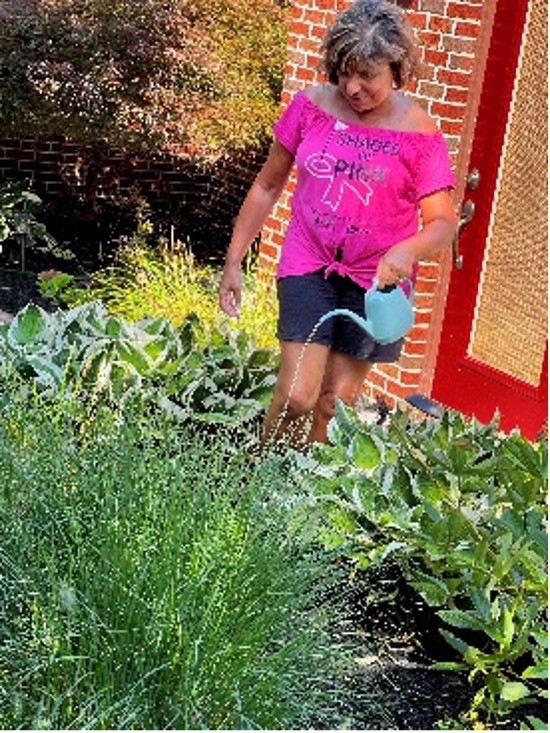
Seven-year cancer survivor, Anne Sischo, enjoys one of her best kept backyard secrets—her lush, green, and flowery perennial gardens.
For Anne Sischo, there was nothing quite like teaching and molding young minds to bring out the best in them. But in the summer of 2015 as she prepared for her upcoming class of kindergarteners, Anne’s life took an unprecedented turn.
“I remember touching my chest and feeling a lump,” said Anne as she took a deep breathe while describing the incident. I felt like something was not right.
As soon as I could gain my composure, I scheduled a doctor’s appointment, and my physician immediately ordered a mammogram.”
“Mammograms are the best defense in detecting breast cancer early when it is most treatable,” Rohit Gosain, MD, medical oncologist, and hematologist, UPMC Hillman Cancer Center at UPMC Chautauqua, says.
According to statistics from the American Cancer Society, overall, the average risk of a woman in the United States developing breast cancer sometime in her life is about 13 percent. This means there is a 1 in 8 chance she will develop breast cancer. Women 45 to 54 should get mammograms every year.
The National Comprehensive Cancer Network® recommends that women at high risk of breast cancer get a mammogram and breast MRI annually starting at age 25 depending on the type gene mutation and/or youngest age of breast cancer in the family.
Although nothing can eliminate the risk of breast cancer completely, eating a balanced diet, maintaining a healthy weight, limiting alcohol consumption, not smoking, and regular exercise are positive actions that can lower a person’s risk.
I highly recommend that women talk with their doctor about their risk for breast cancer and getting screened. Together, you and your physician can decide what is best for you.”
After a mammogram and various diagnostic tests and evaluations, Anne was told she had Stage 2 (II) breast cancer.
“It was a terrifying moment when I heard the words, ‘you have breast cancer’,” Anne said. “I was scared. I sat there stunned. I did not have the first notion of where to go or who to turn to for help. I was paralyzed.
Shortly after my diagnosis, I began a four-month regimen of neoadjuvant chemotherapy. After chemotherapy treatment, my physician recommended bilateral mastectomy and reconstructive surgery. It was one of the more difficult times of my breast cancer treatment.”
During this time, Anne gained a notable regard for her cancer care navigators.
“Receiving a cancer diagnosis is shocking. But for me, one of the toughest times was navigating through what felt like a maze of scheduled tests, appointments, waiting to hear results, and getting answers to questions. I quickly understood that I relied heavily on my clinical navigators to get me from point A to point B,” she said.
Anne began to recognize that no one should go through the cancer care journey alone.
Patient Navigators: Who We Are and What We Do
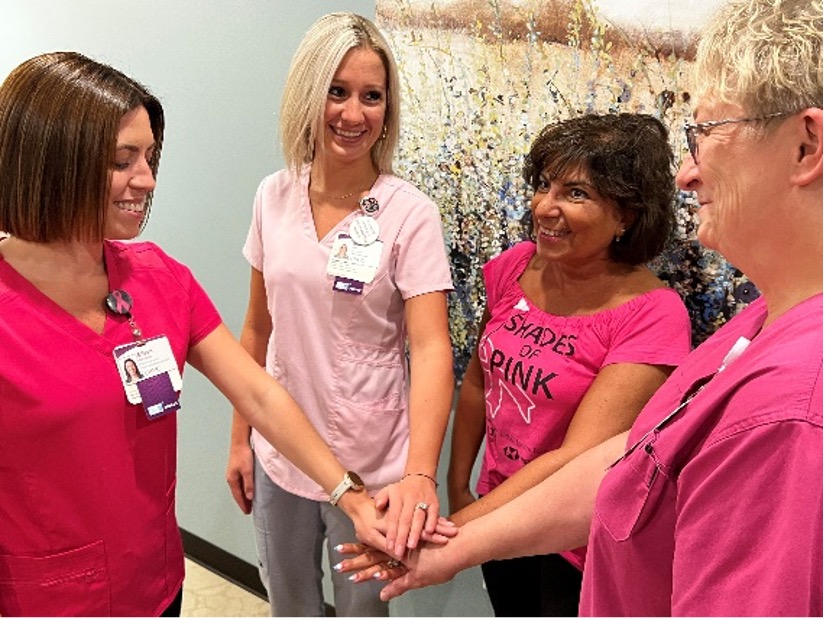
Anne Sischo celebrates her survivorship with breast imaging certified navigators from left, Eileen Bertrando, RT (R) (M), CN-BI, certified navigator, breast imaging; Brooke Mareri, RT (R) (M), CN-BI, certified breast health clinical navigator; Anne Sischo, cancer survivor; and Dianne Courtney-Freeman, RT (R)(M), CN-BI, certified navigator, breast imaging. Proceeds made possible from Shades of Pink Fund pay for the education and certified requirements for the three UPMC Chautauqua breast imaging navigators.
Three certified breast imaging navigators at UPMC Chautauqua Imaging Services help navigate patients through the health care system and direct patients to health care services for timely diagnosis and treatment.
“Our navigators are a crucial support system for our most vulnerable patients,” says Dianne Courtney-Freeman, RT (R)(M), CN-BI, supervising imaging services and certified breast imaging navigator, UPMC Chautauqua. “We hold the patient’s hand during preliminary diagnostic procedures to reduce the patient’s anxiety. It is essential that the patient maintains a healthy quality of life through this important period. These navigation steps make a real difference in the patient’s overall outcomes. Getting a diagnosis of cancer is traumatic enough. Our job is to assess the barriers to care—whether it is lack of transportation, scheduling or tracking appointments, consults with physicians and health care experts, helping patients understand a hospital bill or assisting patients through next phase of the health care continuum.
We want to ease the patient’s mind. Care coordination involves deliberate patient care activities and sharing of information, when appropriate, with the participants involved in the patient’s medical care. This means that the patient’s needs and preferences are communicated at the right time to the right people. It is our responsibility and privilege to assure that the patient receives what he or she needs to move forward to the next stage of survivorship.”
Expert Care Right at Our Doorstep
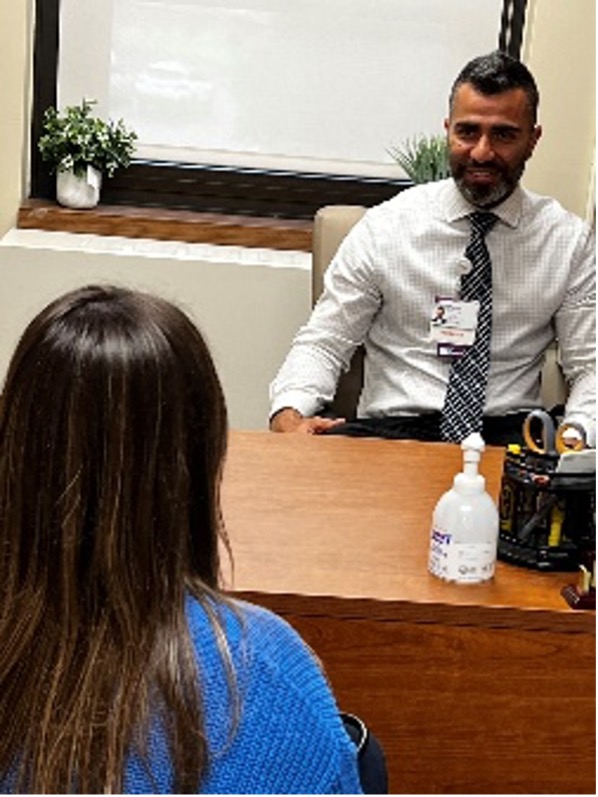
Rohit Gosain, MD, board certified in internal medicine, medical oncology, and hematology at UPMC Hillman Cancer Center discusses a patient treatment plan with his staff member. Dr. Gosain treats all medical oncology and hematology cases. UPMC Hillman Cancer Center at UPMC Chautauqua opened in the Fall of 2019 and offers specialized medical oncology treatments. Located in Suite 3B inside UPMC Chautauqua, UPMC Hillman Cancer Center allows patients to receive the highest level of cancer care without having to leave their communities.
UPMC Hillman Cancer Center at Chautauqua provides specialized diagnosis, treatment, prevention, and care for patients and their families.
“A cancer diagnosis and treatment can place stress on every aspect of your being,” said Dr. Gosain.
“Cancer is complex at best. Its treatments often require a mix of therapies including medical, radiation, and surgical along with lifestyle changes. The advantage for our patients is that everything is available right at our doorstep. Being part of the UPMC system that is recognized for its world-class patient and family-centered care at our local hospital, exposes patients to multiple other medical providers from multiple specialties and provides the best in care, locally.
We take an integrated approach to care while serving the medical needs of our patients from the moment of diagnosis through recovery and that is a bright light in an otherwise very emotional and demanding time for patients and their families.”
Dr. Gosain goes on to explain that cancers are a complex family of diseases that call for equally diverse treatments. Depending on the diagnosis, a treatment program may call upon multiple specialists and several types of treatments.
“All of the tests, appointments, and medical jargon can easily overwhelm the patient,” said Dr. Gosain. “This is where the patient navigator steps in. The role of the navigator is to recognize and bridge communication gaps. The skilled navigator has the specialty knowledge and capabilities to effectively guide patients through the health care system during this time of high stress.
Likewise, I recommend the patient invite a family member or caregiver to come with them to scheduled appointments and treatment sessions. Having someone to sit next to you and take notes is extremely helpful in assuring the most vital information is documented and retained so the patient understands the subsequent steps in treatment before he or she leaves the room. Cancer is exceedingly difficult to face alone. A family member or friend can help by simply being present. Opening the lines of communication between the patient and caregiver reduces anxiety and distress for both parties, and staying positive and informed through this multifaceted journey is one of the more important aspects of care to maintain optimal patient outcomes. The presence of a loved one, regardless of whether they are a spouse, child, parent, caregiver or friend is essential from the onset of the consultations through the transition to life after cancer,” Dr. Gosain said.
Anne revealed, “After months of treatment and added months of recovery, Anne is seven years into her survivorship and feeling great.
“It is not an easy road, but I got through it with the love and support from so many wonderful nurses, doctors, staff, family, and caregivers who helped managed my care. You find gifts when you journey through struggles. You think of it as a learning experience.
It takes a village of people to recover from cancer. Recovery can be physically and emotionally challenging. Thankfully, I felt well enough during treatments to continue working which kept me from sitting at home, worrying, and feeling nervous. I kept telling myself that I am a fighter, I am strong, and I can do this with the help of some amazing people.
Today, I will tell others who ask me questions about how to navigate their cancer diagnosis to give themselves lots of patience and space to recover. Know that, although it may take some time, eventually you will begin to feel better again.”
Paying It Forward
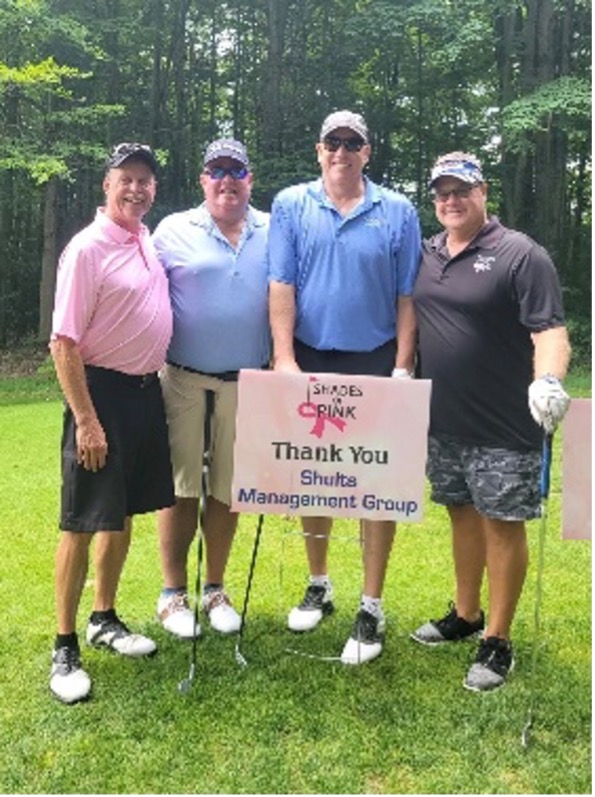
From left, Gary Yeager, Dean Weaver, Tim Shults, Shults Management Group, 2022 Shades of Pink Golf Tournament large sponsor; and Steve Sischo, Anne’s husband, prepare to tee off at the annual Shades of Pink Golf Tournament. Proceeds from the tournament support the Shades of Pink Fund, a WCA Foundation endowed fund. (Submitted Photo)
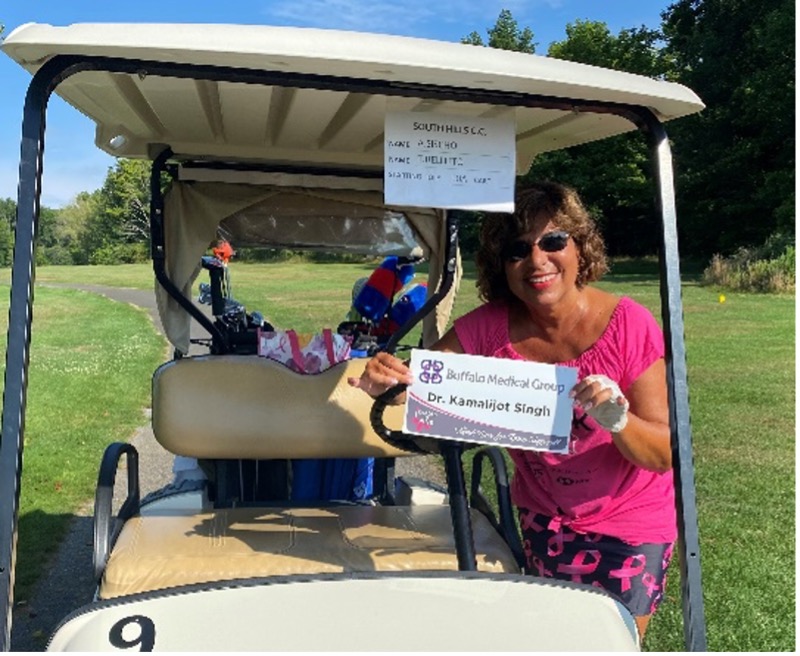
Anne Sischo who established the Shades of Pink WCA Foundation endowed fund displays one of the many golf tournament sponsor markers on the course at South Hill Country Club including, large sponsor Buffalo Medical Group. Local sponsors and businesses help fund Shades of Pink. (Submitted Photo)
After observing the impact cancer had on her family, Anne, her husband, Steve, and good friend, Randy Grey, created Shades of Pink, a WCA Foundation endowed fund that certifies patient navigators at UPMC Chautauqua for those fighting breast cancer.
“Through our fund, we support the educational requirements to endorse breast imaging navigators who coordinate care across radiology, surgery, psychiatry, social services, and other hospital and physician activities,” Anne said.
Anne explains the Shades of Pink Fund would not have been possible without an outpouring from the community, volunteers, golfers, and business sponsors.
“Each year, we host the Shades of Pink Golf Tournament at South Hills Country Club,” said Anne. “The annual tournament proceeds support and sustain our fund. Without the generous aid of our large sponsors including UPMC, Shults Auto Group, and Buffalo Medical Group, together with so many others, Steve, Randy, and myself could not achieve our founding mission to support this great cause.
Shades of Pink gives patients access to necessary services and resources that help patients during and after the cancer care process.
In addition, funds help patients find comfort during treatment including financial and emotional assistance; advancements in mammography technology; and information and promotional materials that offer good breast health tips and how to live a healthy life.
We want patients to focus less on their difficult daily challenges and more on their full recovery, so they do not feel alone in the process.
I never want a person to feel that he or she does not comprehend the next step to recovery or feels alone. The weight is too heavy a burden to carry without help,” Anne indicated.
A Foundation of Giving
“Our mission is uncomplicated,” said Kristin Melville, executive director WCA Foundation. “Our purpose is to sustain the health care services of UPMC Chautauqua to deliver the absolute best in patient care, close to home.
A diagnosis of cancer can be daunting, but do not let your fears control your ability to get the care required to survive cancer. The Shades of Pink Fund aims to meet those immediate needs by navigating the cancer journey and removing the barriers that keep patients from getting the care they need when they need it. It is about finding the beauty during a challenging time and empowering individuals who have been impacted by a diagnosis of cancer.”
Those who would like to make a tax-deductible gift to support Shades of Pink Fund or donate to one of the many endowed foundation funds that support cancer care through the foundation are asked to contact Kristin Melville, executive director, WCA Foundation at 716-664-8665 or email Melvillek@upmc.edu. You may also mail your tax-deductible gift to: WCA Foundation, Jones Health, 51 Glasgow Avenue, PO Box 840, Jamestown, NY 14702-0840.
The Right Steps Save Lives
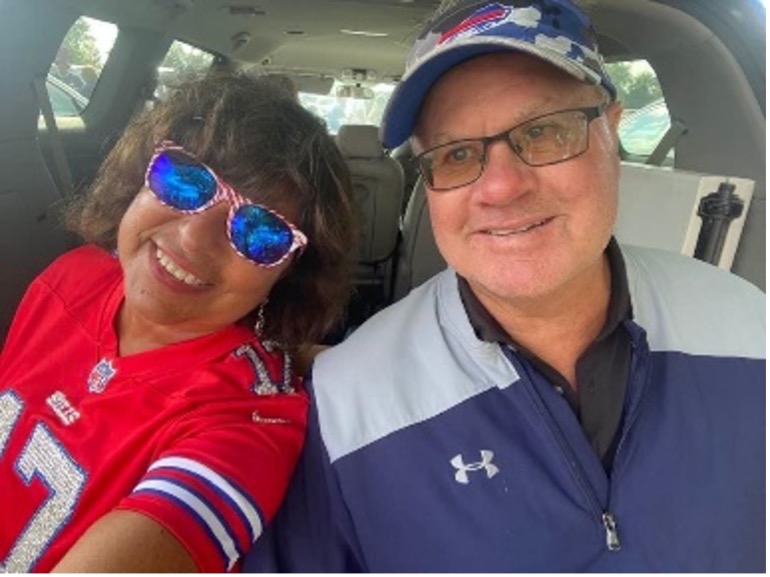
From left, Anne and husband, Steve, begin the trip to watch the Buffalo Bills in Orchard Park. Ann has found her way back to the rewarding life she knew before cancer.
“I do not believe I would have been able to complete this journey without the love and support of my husband, parents, sister, and extended family and friends, as well as the countless co-workers, students, and parents who encouraged me every step of the way.
I am having the time of my life. I retired from teaching, and spend more time at home and with family, friends, and care for my mom. Steve and I are superfans of the Buffalo Bills and attend the regular season games in Orchard Park.
Life does not come without moments of reflecting on my diagnosis and cancer care journey, but I stay ahead of my thoughts by doing the right things to stay cancer free. I can finally say that I am feeling comfortable in my body again.
If I leave one important message with readers, it is to pay attention to your body and get screened. It saved my life, and it can save yours too.
There are so many resources available in Jamestown and surrounding communities that help you navigate your way back to recovery and beyond. Take the major step—talk to your doctor, and get screened. Then call us if you need us. We really care about your wellbeing,” revealed Anne.



